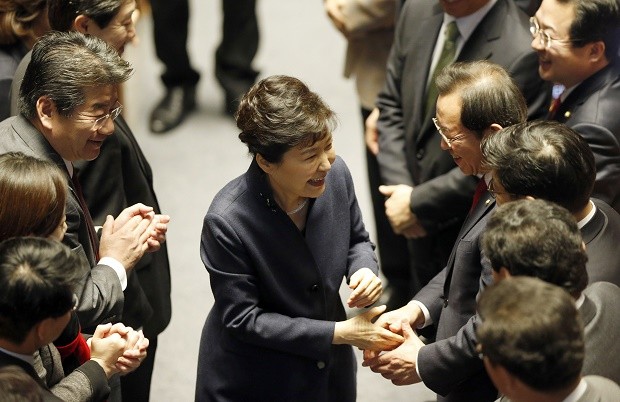South Korea, its rival and the power of words

South Korean President Park Geun-hye, center, is greeted by lawmakers after delivering a speech at the National Assembly in Seoul, South Korea, Tuesday, Feb. 16, 2016. South Korea’s president warned Tuesday that North Korea faces a collapse if it does not abandon its nuclear program, in unusually strong language that will likely infuriate Pyongyang. President Park Geun-hye made the remarks during a speech at parliament while defending her decision to shut down a jointly run factory park in North Korea amid a heightened standoff over North Korea’s recent nuclear test and rocket launch. AP
SEOUL, South Korea — Don’t believe in the power that words hold on the edgy Korean Peninsula?
Consider, then, how many verbal red lines South Korea’s president stomped across Tuesday when she let fly against North Korean leader Kim Jong Un.
She warned, in the bluntest possible way, of the authoritarian North’s worst nightmare — “regime collapse.” She invoked the North Korean leader’s “extreme reign of terror.” Extraordinarily, President Park Geun-hye even used Kim’s name three times in her speech to parliament, something usually avoided at her level.
These words signal a tough new stance from the South in an already anxious standoff that began with North Korea’s nuclear test last month.
READ: S. Korea’s Park says time to play hardball with North
Article continues after this advertisementTo make the combination of jabs sting even more, Park’s comments came on the birthday of Kim’s late dictator father, Kim Jong Il, a revered national holiday in the North.
Article continues after this advertisementHappy birthday, Kim family.
Park’s nationally televised parliamentary address was meant to defend her decision last week to shut down the Koreas’ last major cooperation project, a jointly run factory park in the North Korean border city of Kaesong. Park and her deputies maintain that South Korean payments to workers at Kaesong — $110 million last year alone — have gone in large part straight to the leaders who oversee North Korea’s nuclear bomb and missile programs.
The brusque tone of Park’s comments directly challenge the powerful, ubiquitous North Korean propaganda machine’s portrayal of the dictators who have run the country since its founding in 1948 as infallible and able to stand up to the vicious enemies that surround the tiny, proud North.
Any high-level talk of regime collapse by the conservative president of rival South Korea — and by the daughter of one of the North’s most hated enemies, late South Korean dictator Park Chung-hee — amounts to fighting words.
The harsh rhetoric cuts both ways.
North Korea regularly condemns Park in sexist and violent language, including recently saying that she lives upon “the groin of her American boss.”
Park’s move to shut down Kaesong, which prompted Pyongyang to freeze South Korean assets there and put the park under military control, came in response to the North’s latest rocket launch, which Seoul and Washington see as a cover to test banned missile technology, and just weeks after the North’s fourth nuclear test.
In her speech on Tuesday, Park vowed stronger measures to make Pyongyang “realize bitterly that it cannot survive with its nuclear weapons development and that (such development) will only speed up regime collapse.”
Her comments won’t be universally welcomed in South Korea, which was for decades a dictatorship that brutally crushed any dissent. Even now, below the glittering veneer of modern, vibrant, rich Seoul, deep divisions between liberals and conservatives remain.
Park’s detractors say suspending operations at Kaesong, along with her apparent willingness to introduce a new, advanced missile defense system from the United States, will only worsen the standoff with Pyongyang. Liberal lawmakers also say the Kaesong shutdown won’t hurt the North financially because of its deep trade ties with China, its only major ally and its diplomatic protector at the United Nations.
READ: South Korea’s leader warns of North Korea collapse
The president’s supporters, however, will see her as finally acknowledging the fact that maintaining the park is the same as pumping money into the North’s nuclear and missile programs.
As always, the animosity, both between the Koreas and within divided South Korea, also points to a bitter truth at the heart of the divided peninsula. Both authoritarian Pyongyang and democratic Seoul cherish the notion of eventual reunification; each, however, sees that new single Korea with its own government in charge.
This may seem obvious, but the idea is rarely mentioned by high-level South Koreans worried about upsetting the peninsula’s always delicate state of affairs. Hence the shock some will feel about Park’s blunt warning about “regime collapse.”
In this long-running dispute, words are weapons too.